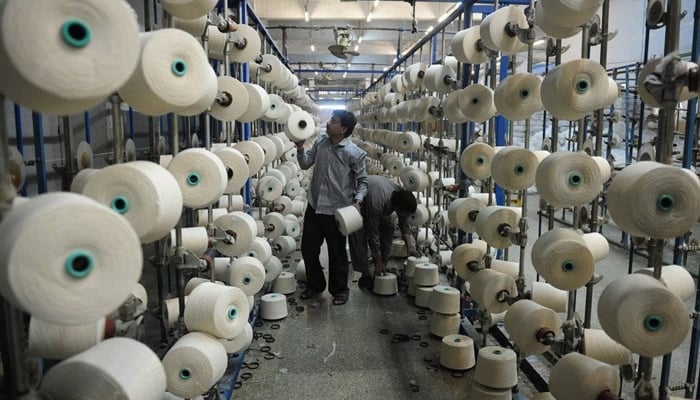Pakistan textile unions call for living wage standards
The National Trade Union Federation Pakistan (NTUF) organized a Textile and Garments Workers Conference at a hotel in Karachi on Friday, with participants demanding meeting living wage standards.
Textile and garments workers and their union representatives, along with workers from export-dominant factories producing merchandise for big international fashion brands from across the country, attended the conference.
The conference discussed frameworks like Pakistan Accord (PA), Global Framework Agreements (GFAs) between IndustriALL Global Union and clothing brands, German Supply Chain Due Diligence Legislation (SCDDL), and the European Union’s Corporate Sustainability Due Diligence Directive (CSDDD), their implementation mechanisms, their problems, and their impact on millions of workers engaged in the textile and garment sector.
The conference was presided over by Syed Sajjad Hussain Gardezi, Pakistan Textile Workers Federation (PTWF) General Secretary.
Addressing the participants online, IndustriALL Global Union’s Textile Garments Shoes and Leather (LGSL) sector co-chair Victor Garrido Sotomayor said that GFAs between IndustriALL and international clothing brands had established fundamental standards for worker protection. These agreements addressed freedom of association, collective bargaining rights, workplace safety, anti-discrimination measures, living wages, working hours, and environmental protection measures. The GFAs provide a crucial mechanism for ensuring worker rights and sustainable practices across global supply chains.
Nasir Mansoor, NTUF General Secretary, said that the Pakistan Accord, established in 2023 in Pakistan, was built on the Bangladesh Accord created after the 2013 Rana Plaza factory collapse that killed over 1,100 workers. The PA is a legally binding agreement between global brands and trade unions that mandates workplace safety inspections, worker safety training, and a transparent complaint mechanism in Pakistan’s textile industry. He added that the accord covers fire, building, and electrical safety standards, creating legally enforceable obligations for signatory brands.
He viewed the implementation of these legally binding instruments as crucial in impacting the working conditions and rights of workers in Pakistan’s textile and garments industry. Despite contributing significantly—up to 60 percent—to the country’s total exports and being the major source of foreign reserves, the conditions of workers were deplorable as most of them were denied their rights to unionize, decent working conditions, and minimum wages, let alone living wages. They remained vulnerable to occupational safety and health risks while bearing the brunt of climate change on their wellbeing, livelihood, and security.
Comrade Zehra Khan, General Secretary of Home-Based Women Workers Federation (HBWWF) and also one of the co-chairs of IndustriALL’s TGSL sector, shed light on key regulatory frameworks governing supply chains.
-
 YouTube Tests Limiting ‘All’ Notifications For Inactive Channel Subscribers
YouTube Tests Limiting ‘All’ Notifications For Inactive Channel Subscribers -
 'Isolated And Humiliated' Andrew Sparks New Fears At Palace
'Isolated And Humiliated' Andrew Sparks New Fears At Palace -
 Google Tests Refreshed Live Updates UI Ahead Of Android 17
Google Tests Refreshed Live Updates UI Ahead Of Android 17 -
 Ohio Daycare Worker 'stole $150k In Payroll Scam', Nearly Bankrupting Nursery
Ohio Daycare Worker 'stole $150k In Payroll Scam', Nearly Bankrupting Nursery -
 Michelle Yeoh Gets Honest About 'struggle' Of Asian Representation In Hollywood
Michelle Yeoh Gets Honest About 'struggle' Of Asian Representation In Hollywood -
 Slovak Fugitive Caught At Milano-Cortina Olympics To Watch Hockey
Slovak Fugitive Caught At Milano-Cortina Olympics To Watch Hockey -
 King Charles Receives Exciting News About Reunion With Archie, Lilibet
King Charles Receives Exciting News About Reunion With Archie, Lilibet -
 Nvidia Expands AI Infrastructure With Nevada Data Centre Lease
Nvidia Expands AI Infrastructure With Nevada Data Centre Lease -
 Royal Family Shares Princess Anne's Photos From Winter Olympics 2026
Royal Family Shares Princess Anne's Photos From Winter Olympics 2026 -
 Tori Spelling Feels 'completely Exhausted' Due To THIS Reason After Divorce
Tori Spelling Feels 'completely Exhausted' Due To THIS Reason After Divorce -
 SpaceX Successfully Launches Crew-12 Long-duration Mission To ISS
SpaceX Successfully Launches Crew-12 Long-duration Mission To ISS -
 PlayStation State Of Play February Showcase: Full List Of Announcements
PlayStation State Of Play February Showcase: Full List Of Announcements -
 Ed Sheeran, Coldplay Caught Up In Jeffrey Epstein Scandal
Ed Sheeran, Coldplay Caught Up In Jeffrey Epstein Scandal -
 US, China Held Anti-narcotics, Intelligence Meeting: State Media Reports
US, China Held Anti-narcotics, Intelligence Meeting: State Media Reports -
 Paul Anthony Kelly Reveals How He Nailed Voice Of JFK Jr.
Paul Anthony Kelly Reveals How He Nailed Voice Of JFK Jr. -
 Victoria, David Beckham React To Marc Anthony Defending Them Amid Brooklyn Drama
Victoria, David Beckham React To Marc Anthony Defending Them Amid Brooklyn Drama




